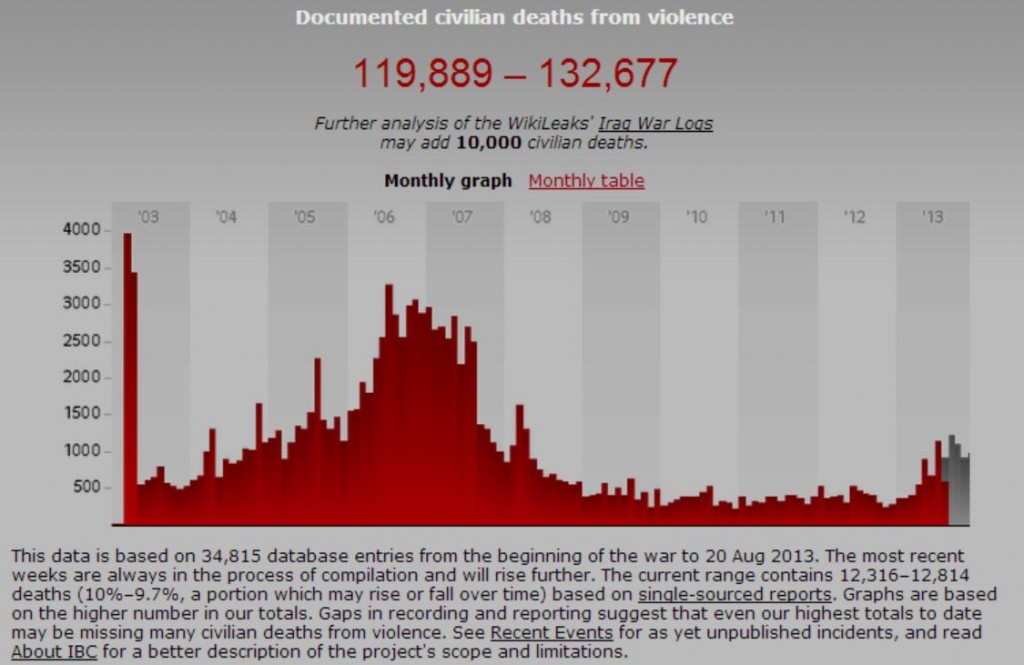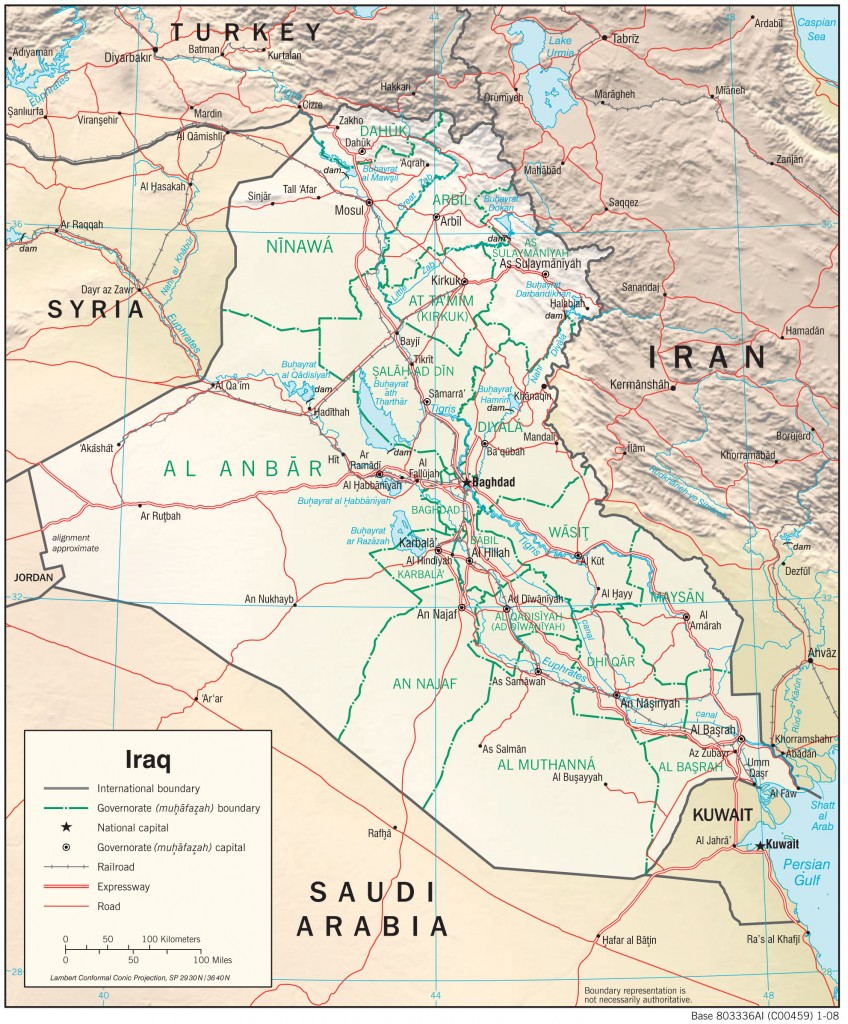After Petraeus Paid Them For Peace, Are Sunnis of Anbar Now Paid by Bandar For Killing?
Iraq has been seeping back into the headlines lately, as civilian deaths there have now reached a level last seen in 2008. What is striking about this increase is that it did not occur until almost 18 months after the last US troops left Iraq.
Here is a screen capture of the latest data on civilian deaths in Iraq by Iraq Body Count:
Recall that the final US troops left Iraq in the middle of December, 2011. The civilian death rate had leveled off in 2010 and remained steady throughout all of 2012, not rising significantly until May of 2013. Recall that earlier this week, conclusions of a National Intelligence Estimate on Afghanistan were leaked, suggesting that should the US completely withdraw troops from Afghanistan as we did in Iraq, the situation would deteriorate very rapidly. With Iraq now at high levels of violence, it would be very easy for politicians to lose sight of the very long gap between withdrawal of our troops and the rise in civilian deaths. Iraq should not be used as a cautionary tale against complete withdrawal though, since there was such a long gap between the withdrawal and the degradation of security.
Recall that David Petraeus was quick to accept praise for the drop in civilian death rates that began in late 2007 and continued throughout 2008. Many attributed this calming to Petraeus’ surge and others ascribed it to the “Anbar Awakening” that Petraeus exploited:
Controversially, he even started putting some Sunni groups – including some that had previously fought the U.S. – on the American payroll. The “Anbar Awakening” of Sunni groups willing to cooperate with the Americans had begun in 2005, but at a smaller scale. Petraeus recognized that the groups had real community influence and ability to bring security, whether he liked them or not, and brought them on board. At the program’s peak in 2008, the U.S. had “contracted” 103,000 fighters who were now ostensibly paid to assist an American-dominated peace rather than the disrupt it. That same year, according to Ricks, the U.S. signed ceasefire deals with 779 separate Iraqi militias.
Other analysts, especially Daniel Davis, came to the conclusion that most of the decline in violence was due to Sunni citizens in Anbar rejecting the extreme violence to which al Qaeda had sunk and especially its toll on fellow Muslims.
As is well known, the turning point in 2007 Iraq came when the heart of the Sunni insurgency turned against al-Qaeda and joined with US Forces against them, dramatically reducing the violence in Iraq almost overnight. The overriding reason the Sunni insurgency turned towards the United States was because after almost two years of internal conflict between what ought to have been natural allies – al Qaeda in Iraq (AQI) and the greater Sunni insurgency – a tipping point was reached whereby the Iraqi Sunnis finally and decisively turned against AQI. Had this unnatural split not occurred, by all accounts I have been given on both the Iraqi side and the US military side, “we would still be fighting in Iraq today,” in the words of two officers I know who fought there.
Although there likely are many factors that contributed to the eventual outbreak of violence in Iraq that elevated civilian death rates, one possibility that intrigues me is that the timing fits reasonably well to be a part of Saudi intelligence chief Bandar bin Sultan’s play for regional dominance. Marcy noted this week that the recent bombings in Russia fit with Bandar’s warning delivered to Putin in a secret meeting last July. But if we go back to the report on that meeting, we see this about Bandar’s regional plan and especially how it applied to Syria:
Bandar discussed the Syrian issue at length. He explained how the kingdom’s position had evolved on the Syrian crisis since the Daraa incident all the way to what is happening today. He said, “The Syrian regime is finished as far as we and the majority of the Syrian people are concerned. [The Syrian people] will not allow President Bashar al-Assad to remain at the helm. The key to the relations between our two countries starts by understanding our approach to the Syrian issue. So you have to stop giving [the Syrian regime] political support, especially at the UN Security Council, as well as military and economic support. And we guarantee you that Russia’s interests in Syria and on the Mediterranean coast will not be affected one bit. In the future, Syria will be ruled by a moderate and democratic regime that will be directly sponsored by us and that will have an interest in understanding Russia’s interests and role in the region.”
So, back in July, Bandar was feeling confident that Assad would be overthrown and that those who established a new government would be firmly under Saudi control. That would suggest that Bandar felt he already had the proper forces in place and under his control.
As we know, things didn’t quite go the way Bandar expected in Syria, as the US backed off an attack at the last minute and chose a diplomatic approach with Syria surrendering its chemical weapons. Bandar has continued his meddling, though, and one of his charges just got arrested for activity in Lebanon:
Lebanese military authorities have arrested the leader of the Abdullah Azzam Brigades, the offshoot of al-Qaeda that claimed responsibility for the double suicide bomb attack on the Iranian Embassy in Beirut in November, according to Lebanese news media.
The leader, Majid al-Majid, is a Saudi national whose radical Sunni group is closely allied with al-Qaeda in Iraq. The reports did not say when the arrest took place.
The Abdullah Azzam Brigades came into being years before the conflict across the border in Syria, but the group has allied itself with extremists among the rebels fighting President Bashar Assad there and threatened more attacks if the Lebanese Shiite militia Hezbollah did not stop sending its fighters to support him. Recently, Al-Majid reportedly pledged allegiance to the Nusra Front, another al-Qaeda-linked group fighting in Syria.
Hmm. Saudi support for a group in Iraq that is meddling both in Syria and Lebanon. Have a look at the CIA map of the regions we are discussing here:
The Anbar Province of Iraq (along with the much more peaceful Jordan) is what separates Saudi Arabia from Syria. It’s looking to me that Bandar decided that if Petraeus could pay off the Sunnis of Anbar to be peaceful, he could find a price at which they would help him with his plan for regional dominance.



New York Times reporting tonight that parts of Ramadi and Fallujah have fallen to al Qaeda: http://www.nytimes.com/2014/01/03/world/middleeast/Al-Qaeda-threatens-Iraqi-cities.html?pagewanted=all
The 2007 surge in Iraq, touted as a success by many, had as its primary objective the reconciliation of Shia and Sunni in Iraq to correct the dismissal of Baathists from government and also the effects of the Samarra mosque bombing on February 22, 2006 which more than anything set Shia against Sunni in Iraq.
But the surge was not a success in that regard, despite the buying of the Sunni, and the purging of Sunni from Baghdad, and we’re currently seeing Saudi Arabia capitalize on that failure, probably with US assistance since Iraq is an ally of Iran, and thus a nation to be destabilized.
So I have no doubt that the US is acting with Saudi Arabia in this endeavor, by again supporting jihadi terrorists to destabilize a country, as in Afghanistan, Libya and Syria.
The wild card — Vladimir Putin. Vlad’s justifiably pissed about Bandar’s work in Volgograd which among other effects threatens Putin’s pet project, the upcoming Olympic games in Sochi. Add to that Bandar’s work in the new Russia ally Iraq, and there is going to be a happening, I believe. Look for it.
Petraeus did say that Iraq was fragile and reversible, several times.
WaPo, September 7, 2007
General Petraeus’s view is considered overly cautious by some other senior military officials and some members of the Joint Chiefs of Staff, officials said. But they said it reflected his concern that the security gains made so far in Baghdad, Anbar Province and other areas were fragile and easily reversed.
sinodaily, Dec 23, 2007
“Obviously, we want to reduce the strain on our ground forces as much as we can while recognizing that what has been achieved here remains tenuous and is still fragile in a number of areas,” Petraeus said on Fox News Sunday.
limun, Dec 28, 2007
Iraq has pulled back from the brink of civil war, but recent security gains are fragile and still reversible, the top U.S. commander in Iraq, General David Petraeus, said on Saturday.
Reuters, Dec 29, 2007
Assessing the overall security situation in Iraq, Petraeus said progress toward curbing sectarian violence was “tenuous in many areas and could be reversed”.
humanevents, Mar 6, 2008
Citing the reduction in violence in most areas of Iraq in the past six to eight months, a confident but cautious Gen. David Petraeus told me Thursday that the progress in Iraq is both tenuous and reversible.
WaPo, April 9, 2008
During a day of hearings against the backdrop of a heated campaign for the White House, Petraeus called security in Iraq “significantly better” than before last year’s troop buildup but still “fragile and reversible.”
NYTimes, Aug 20, 2008
“It’s not durable yet. It’s not self-sustaining,” he added. “You know — touch wood — there is still a lot of work to be done.”
Fox News, April 24, 2009
Progress in Iraq is still “fragile and reversible,” Gen. David Petraeus warned Friday after back-to-back homicide bombings killed nearly 80 people one day earlier in Iraq’s deadliest day in more than a year.
Reuters, Mar 16, 2010
“The progress in Iraq is still fragile. And it could still be reversed,” Petraeus told a Senate hearing.